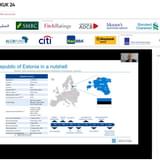Russia
The U.S. Treasury Department enacted new sanctions on Russian companies and individuals as well as separatists in rebel-held areas of eastern Ukraine as President Donald Trump held White House talks with Ukrainian leader Petro Poroshenko. Sanctions over the fighting in eastern Ukraine “will remain in place until Russia fully honours its obligations under the Minsk Agreements,” while measures “related to Crimea will not be lifted until Russia ends its occupation of the peninsula” the Treasury Department said in a statement.
Global bond investors showed strong demand for Russia's new Eurobond, as the yields offered by Moscow eclipsed political risks, including signs that Western sanctions could be about to get tighter. The finance ministry offered a two-tranche Eurobond worth US$3bn and order books had topped US$6.6bn, a market source familiar with deal details told Reuters. The official release is due later on Tuesday. Raising US$1bn in a 10-year sovereign Eurobond issue, Russia set final yield guidance at 4.25%, while the guidance on its 30-year bond was 5.25%.
The Russian government, corporates and financial institutions have so far raised more than US$17bn from international bond markets, according to research from JP Morgan, more than the US$15.2bn raised by Russian entities in the international markets last year. These figures are down from 2013 deal flow highs of US$52.1bn.
Rosneft shareholders replaced the Russian energy minister and Gazprombank's top manager in the new board of directors with candidates proposed by a consortium of Swiss trading and commodities giant Glencore and Qatar's state fund, which had bought a 19.5% stake in Russian oil giant in a deal last year. According to local news agency TASS, Russian Energy Minister Alexander Novak and Gazprombank Chairman of the Management Board Andrey Akimov were replaced by Glencore CEO Ivan Glasenberg and Qatar Foundation President for Research and Development Faisal Alsuwaidi.
Russian Regional Development Bank (RRDB), owned by Russia's largest oil producer Rosneft, has taken over the ailing Orthodox Church bank Peresvet, the bank's documents showed. Peresvet said on a regulatory filing that RRDB has become the owner of nearly 100% of the bank after Peresvet held an additional share issue, part of a process to prevent the bank from going into bankruptcy. In October last year, the Central Bank introduced a "temporary administration" at Peresvet, half of which belongs to the Russian Orthodox Church, as the lender faced issues with its capital.
RussHydro is moving ahead with plans to offer RUB10-15bn in fresh bonds in the third quarter this year, according to a statement from the company's first deputy CEO George Rizhinashvili. The bonds will be listed on either the Irish or London Stock Exchange. The company has about RUB90bn in bonds outstanding to date.
Russian fintech company SimpleFinance hit the international capital markets to place a US$30mn 3-year bond. The notes carry a 10.5% coupon and were sold at par. Renaissance Capital acted as sole lead on the trade.
The Russian Finance Ministry sold US$1bn in 10-year bonds at a rate of 4.25% and US$2bn in 20-year notes at 5.25%, largely to US investors. The move highlights persistently strong demand for Russian debt in the face of growing US-Russia tensions and fresh sanctions. The Russian government said demand for the notes topped US$9bn.
Norilsk Nickel and BASF have struck and agreement that will see the two companies partner on the development and sale of raw materials for the production of lithium-ion batteries sold in Europe. As part of the deal, BASF plans to invest up to €400mn in a bid to build new production plants for cathode materials involved in the production of the batteries, with Norilsk Nickel providing raw materials for the batteries.
Russian Manufacturing PMI dropped slightly in June to 50.3, down from 52.4 the previous month, despite continued growth in production for 14 consecutive months. "The level of employment among Russian manufacturers declined for the fourth consecutive month in June. The pace of job shedding was the second-fastest since last September," IHS Markit analysts explain.
Russia's VTB, one of the biggest lenders to the indebted Croatian food producer Agrokor, may contribute to a new loan to the company, Reuters reported. Last month, Agrokor secured a US$602.4mn loan from banks, bondholders and suppliers, as a part of the restructure process and under so-called "roll-up" arrangement. This means that when the loan matures, the company will settle some of its other debts to the lenders at the same time as repaying the loan. VTB did not say how much it is considering to contribute but added that it did not plan to sell its exposure on the Croatian corporate.
Russian gas giant Gazprom Neft is looking to launch a new debt issuance programme, following a successful placement of its RUB15bn bond in April, which saw a yield of 8.7%. While the volume of the new programme is yet to be decided, Russia’s Interfax agency reported.
Russian state holding Sviazinvestneftekhim will offer RUB20–25bn 5-year bonds on Tuesday, with the first coupon guidance set at 8.8–9.0% annually, corresponding to an 8.99–9.20% annual yield to maturity. AK BARS Bank, Gazprombank, Rosbank and Sovcombank were listed as the co-organizers.
ACRA, Russia’s credit ratings agency, assigned a BBB- rating to Otkritie bank, one of the country’s top-10 lenders – the lowest rating of any “systematically important” bank in the country. The agency cited high volume of overdue loans (15%) and distressed credit (20%), as well as high cost of risk and low margins as key reasons for the downgrade. The move means that Otkritie will lose access to federal funds and the country’s largest non-government pension fund. Otkritie’s bonds will also be removed from the Central Bank’s Lombard credit list.
Russia's Promsvyazbank approved a plan to offer up to US$600mn through the sale of fresh perpetual Eurobonds under the lender's EMTN programme, the bank said this week. The bonds will be issued through an affiliate, PSB Finance S.A., the bank said. The lender last issued notes in October, placing US$250mn in 3-year notes with a 5.25% coupon.
Russia and China have set up a US$10bn joint fund, the Russia-China RMB Cooperation Fund, with the proceeds to be put towards cross-border infrastructure projects linked to China's "One Belt, One Road" initiative. The deal was announced while Chinese President was in Russia on a diplomatic tour with Russian leader Vladimir Putin. The fund will be managed jointly by the Russian Direct Investment Fund sovereign wealth fund and the China Development Bank. Some of the projects earmarked for further investment include the China-Russia Tongjiang Railway Bridge (also known as the Amur International Rail Bridge) and the highway bridge in Heihe, Heilongjiang Province.
The Russian finance ministry said that it would buy a mere RUB74.3mn worth of foreign currency in July, nearly 700 times less than the US$45bn it spent buying up hard currencies in the FX market last month. Analysts believe that lower-than-expected revenues from oil due to persistently subdued prices have led the sovereign to significantly cut back.
Russia's second-largest bank VTB is reportedly in discussions with the government of the Democratic Republic of Congo over assistance in issuing a Eurobond, the bank said in a statement. Earlier Congolese officials claimed the country was is in talks with Russian state-owned bank VTB over potential investments worth as much as US$1bn, but in a statement issued shortly after VTB insisted it gave no commitment to lend to Congo and that it did not currently plan to.
Russia is prepared to maintain status quo on the current OPEC deal, but said it is not interested in any proposal for deeper production cuts, Bloomberg reported citing four Russian government officials. According to one of the sources, the Kremlin’s reasoning is that such a move would suggest that OPEC, Russia and their allies are nervous that their pact to reduce output by a combined 1.8 million barrels a day through March 2018 isn’t doing enough to support prices.
The Russian Central Bank is in mild shock following an unexpected jump in inflation, after months of consumer price falls. The jump in inflation to 4.4% annually in June was a “unpleasant surprise,” said the CBR chief Elvira Nabiullina, adding that the rate might not come down much in July. “The shock in June was big,” said Igor Dmitriev, head of the monetary policy department at the Bank of Russia, Dmitriev said inflation had fallen faster than expected in recent months and the Central Bank is still calculating the impact the June figure will have on its trajectory for reaching its target of 4% at the end of the year.
Russian power grid operator Rosseti has set the final guidance for the first coupon on its RUB5bn 5-year bond at 8.15% annually, according to PRIME news agency. The technical placement of the bond is scheduled for July 14, with Gazprombank and Alfa-Bank acting as organizers.
Russia's Sberbank announced it had acquired 18.53% of the shares of Slovenian retailer Mercator at a public auction at the starting price of EUR40.6mn (US$46.2mn). Sberbank previously seized the shares from the Netherlands-based financial holding company Agrokor Investments B.V., which had offered them as collateral for a loan extended by the bank to Croatia's ailing food-to-retail concern Agrokor, according to SeeNews, which quotes sources in Sberbank. Mercator is majority owned by Agrokor.
Russia's Central Bank said it had introduced temporary administration in mid-sized Bank Yugra for six months and imposed a three-month moratorium on creditor claims to the bank. Yugra's financial position is not stable and presents risks to its creditors and depositors, the CBR said in a statement. According to a CBR representative, the regulator has noticed signs of possible illicit withdrawals of assets and forged accounts at Yugra bank in recent months. Of the more than RUB180bn (US$2.98bn) in deposits at Yugra, some RUB170bn are insured by the state, said Vasily Pozdyshev, deputy Central Bank governor. Yugra is in the Top-30 banks in Russia by size and in the Top-20 by volume of private deposits.
The founder and key shareholder of Tinkoff Bank Oleg Tinkov, is looking to raise his stake in TCS Group Holding, which owns the bank, by buying global depositary receipts (GDRs) for up to US$30mn, the holding said in a statement.
Gazprom, the Russian gas monopoly, warned investors of potential risks ahead of its latest Eurobond launch. Additional US sanctions against Moscow, currently being mooted in the US Senate and Congress, may delay or altogether end some of Gazprom's upcoming projects, including Nord Stream 2 and Turkish Stream gas pipelines, the prospectus noted. "The risk of the United States imposing sanctions... may result in delays, or otherwise impair or prevent the completion of the projects by the group. The group's export pipeline projects (including Nord Stream 2 and Turkish Stream) and deepwater, Arctic offshore or shale projects that have the potential to produce oil in the Russian Federation or elsewhere in the world may face difficulties."
Russia saw a net capital outflow of US$14.7bn in the first half of 2017, a 71% increase from the same period of 2016, stemming from a combination of factors including a weakening rouble, renewed drop in oil prices and possibility of additional US sanctions on Russian issuers. According to Central Bank data published on Tuesday, net capital outflow in January-June was mostly driven by banking sector transactions related to inflows to resident clients' accounts in early 2017 as well as by foreign debt repayments, the Central Bank said, adding that the country's current account surplus totalled US$23bn in the first six months of the year compared with US$14.9bn in the same period of 2016.
Russia’s Alfa-Bank plans to hold a road show for 4–5 year RUB-denominated Eurobonds shortly, according to Russia’s PRIME agency. Alfa-Bank and Citi will act as the organizers. The Russian lender has already tapped the international markets this year, issuing a 5-year RUB10bn Eurobond in February this year, and a EUR400mn 3-year Eurobond in March (via its holding company ABH Financial Limited).
Russian state-owned oil giant Rosneft announced agreement with Sberbank to borrow RUB125bn from the lender. The statement, published on the federal purchase registry, does not specify what the funds will be used for, but notes that the deal was dated June 23 and was part of a non-competitive procurement, carrying a maturity of 3 years. Notable, earlier the same week Russian oil group’s chief executive Igor Sechin announced that the company received the legal clearance to continue with its planned US$13bn takeover of India’s Essar Oil. According to Sechin, the Essar deal will transform the Russian oil sector’s marginal presence in India, the world’s third-largest crude importer and allow the state-controlled company to increase its oil refining output by 20% this year.
CIS
Moody’s has maintained a stable outlook for Ukraine’s banking citing that modest GDP growth is improving asset quality. According to the rating agency, while Ukrainian banks' total stock of problematic assets will remain high, steady GDP growth will lead to a gradual reduction in non-performing loans.
Stated owned Ukrainian Railways, will issue corporate bonds worth UAH2bn in 2017, the press service of the company has reported. Concorde Capital will place the bonds after the approval by the supervisory board.
The Eurasia Development Bank is mulling over plans to tap the Eurobond market with issuances in roubles and Kazakh tenge, according to Interfax, which quoted the EBD chief Dmitry Pankin. Pankin said that while there is no need to issue at this moment, strong demand for its 3-year KZT15bn bond suggested that further borrowing may take place if conditions remain comfortable.
Belarus tapped the international markets with a double-tranche bond worth US$1.4bn. The first US$800mn tranche matures in 2023 and carries a 6.87% coupon. While the second US$600mn tranche matures in 2027 with a 7.625% coupon. Citigroup and RBI Group managed the transaction.
Ukrainian railway monopoly Ukrzaliznytsia (RAILUA) has signed a financing agreement with the EBRD in a move that will enable the company to purchase new freight railcars, according to the company's CEO. The EBRD will provide US$150mn, possibly in local currency, while the company may look to use the proceeds from an impending UAH2bn (approx. US$70mn) bond sale to finance the rest of the spending initiative.
The Permanent Court of Arbitration in The Hague confirmed that it has jurisdiction and will hear the case of a Ukrainian company seeking to recover damages for property lost when Russia annexed Crimea in 2014, Reuters reported. The court said that the case launched by PJSC Ukrnafta seeking damages for expropriated petrol stations is covered by a bilateral Ukraine-Russia treaty. In a related decision, the court said it would also hear claims brought against Russia by Stabil LLC and ten other companies.
The next tranche of Ukraine’s US$17.5bn international bailout will be delayed until later this year because its parliament will not be able to vote on reform legislation in time before its summer recess. While a pension overhaul is on schedule and steps are being taken to create an anti-corruption court, a bill on land reform won’t be submitted in time, Prime Minister Volodymyr Hroisman said, quoted by Bloomberg. The delay will hold up US$1.9of the fifth tranche from the IMF rescue package, but Hroisman reiterated that the government remains committed to deliver on its promises.
Azerbaijan's foreign currency reserves rose by US$3bn in the first half of 2017 to US$40.6bn, President Ilham Aliyev told the government meeting. Azerbaijan, an energy-rich ex-Soviet republic, has seen its economy shrinking and its currency weakening as oil prices have fallen. "Despite a fall in oil prices, we managed to boost our currency reserves, which is a result of a correct economic policy," Aliyev was quoted by the state news agency Azertag. He said that the non-oil sector grew by 1.7% year-on-year in the six months of 2017, while non-oil industry grew by 4.4% and the amount of investment totalled US$5bn.
Europe
The National Bank of Hungary (NBH) kept interest rates on hold, as markets focused on a possible further squeeze on short-term deposits to keep downward pressure on borrowing costs. The central bank’s decision to hold its base rate at a record-low 0.9% was anticipated by all 16 analysts in a Reuters poll.
Romania's ruling Social Democrats picked Mihai Tudose, who currently serves as Economy Minister, to replace the country's recently ousted Prime Minister. Sorin Grindeanu was canned by his own party last week following a no-confidence motion, with lawmakers accusing the controversy-stricken PM of failing to fulfil election promises and failing to effectively deliver on the party's anti-corruption agenda.
EuroChem is set to place a 4-year dollar-denominated Eurobond with yield guidance of 4.3%. The company held a roadshow in Switzerland and the UK in June. Citi, J.P Morgan, Credit Agricole CIB, Sberbank CIB, SG CIB and UniCredit are managing the transaction.
Polish energy company TAURON Polska Energia S.A. hit the international markets to place a €500mn bond. The notes maturing 2027 carry a 2.375% coupon and priced at 99.438% to yield 2.44%. JP Morgan, Mitsubishi UFJ Financial Group, and Banco Santander managed the sale.
Spain’s Repsol has agreed to establish a joint venture with Russian oil company Gazprom Neft, despite the looming threat of additional package of sanctions against Russia’s energy companies currently pending approval in the US House of Representatives. Gazprom Neft, the oil arm of state-run gas monopoly Gazprom, will take a 25.02% stake in and develop oil fields in Repsol’s Evrotek-Yugra project in western Siberia, in a deal that gives the Spanish company access to local expertise while boosting the future output of its Russian counterpart.
State-owned Lietuvos Energija AB issued international bonds for EUR300mn maturing in 2027 with a 2% coupon. Notes were sold at a price of 98.284% with an initial yield of 2.19%. BNP Paribas and SEB managed the transaction.
EBRD has issued a RUB3bn 6.75% international bond maturing in 2018, with Citigroup selected as bookrunner.
Serbia's Central Bank left its key policy rate unchanged at 4%, and said it expects inflation to continue to move within its inflation target tolerance range of 3%, +/- 1.5pp. The National Bank of Serbia (NBS), which last changed its rate in July 2016 when it cut it to the current level, also said inflationary pressures remain low, as reflected by stable core inflation and inflation expectations in the financial and corporate sector.
Turkey
An aide to President Tayyip Erdogan said that the fact Turkish banks are raising interest rates on deposits is a "big problem" and the government is considering measures to tackle this. Cemil Ertem made the comment in an interview with broadcaster NTV. Turkey wants to see low interest rates across the board in order to spur spending, consumption and growth. Ertem did not give details on what kind of measures the government could take.
Turkey’s Eximbank announced it had signed three-year syndicated loans worth €186.5mn. French lender, Societe Generale acted as global coordinator for the facility which will support Türk Eximbank’s provision of medium- and long-term funds to Turkish exporters.
Turkey's Is Bankasi placed US$500mn in the international markets, with the notes due 2028 sold at par to yield MS+5.117%. Citigroup, Goldman Sachs, Mitsubishi UFJ Financial Group, Societe Generale, and Standard Chartered Bank led the sale.
Turkish Deputy Prime Minister Mehmet Şimşek said the country is readying the launch of gold bonds and gold-backed lease certificates before the end of the year to lure "under the pillow" gold back into the economy, according to state run Anadolu Agency. The bonds, which have in the past gained popularity in places like India and South Africa, is part of government efforts to diversify its sources of funding. “We have completed technical works for the issuance of new financial instruments that will enable us to attract many tons of under-the-mattress gold into the economy. The legal framework is about to be finalized. We will offer these instruments to the market over this year,” he told Anadolou.
About 62% of corporate resources used by Turkey's 500 largest companies are secured through borrowing, according to the Istanbul Chamber of Industry (ISO). The figure brings new urgency to rising double digit inflation in Turkey and the precarious position of many of the country's borrowers, who may struggle with repayments as policymakers increasingly become left with little choice but to increase interest rates - a move vehemently opposed by Turkey's president and senior AKP members.
Russian giant Gazprombank is said to be leaning towards exiting the domestic Turkish market, according to reports in Kommersant. Citing unnamed sources, Gazprombank is nearing the withdrawal from Promak, which owns a controlling stake (60%) in two companies importing Russian gas to Turkey — Enerco and Avrasya. The bank owns a 40% stake in Promak.
The Istanbul Metropolitan Municipality has secured €88.3mn to finance the expansion of the city's metro line. The funding was provided by the EBRD, with the total cost of the line's expansion is estimated to be approximately €338.3mn, with the Municipality looking to more than double the length of the existing line.
Turkish PMI posted a modest drop in June as production growth and employment continued to suffer under economic headwinds. The PMI index hit 52.2 in June, down 53.3 in May. Analysts believe increasing interest rates may have also played a role in dampening production and manufacturing.
GarantiBank has renewed its US$250mn annual syndicated borrowing facility, which is expected to be used for global trade finance activities, has a one-year maturity and was self-arranged by the bank for the first time. According to Global Trade Review, the facility drew US$283.5mn worth of offers, but was scaled back. It replaces the US$127.5mn tranche of the former US$250mn one, which was signed last year in June.
Turkish lender TSKB has mandated banks for a 1-year dual tranche syndicated loans, according to Reuters. The bank is looking for a dual-tranche loan denominated in both euros and US dollars. The lender is looking to refinance existing maturities.
The Turkish Treasury auctioned two-year fixed coupon bond worth TRY3.3bn (US$923mn) in the local markets, according to an official statement. According to the Treasury the total tender for the securities was TRY5.5bn Turkish (US$$1.5bn) with a 60.8% accepted/tendered rate. The interest rate of the fixed coupon bonds was accepted at 5.65% term rate.









